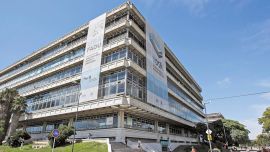Argentina is the country of boom and bust, of bouts of euphoria followed by periods of existential gloom, so the fate of her presidents depends on just when they get to the top of the greasy pole rather than on their own talents. In this respect, Fernando de la Rúa was terribly unlucky. For most of his career, he had contrived to be in the right place at the right time, but then he had the misfortune to take office when the prospects before the economy were a good deal worse than most people realised, and attempts to tell them otherwise were met with indignation. As was bound to happen, he got saddled with much of the blame for the crash which was already coming the country’s way.
Could anyone else have prevented it? Many politicians and almost all journalists make out that they would have done far better than de la Rúa had their compatriots been wise enough to put them in the Pink House in 1999. They are kidding themselves and us. Most people understood this, hence the hostility towards the entire political class that boiled up in the days after de la Rúa’s premature departure as a result of a Peronist-led “civilian coup.”
It is worth remembering that when the country was entering the third millennium, Domingo Cavallo’s brainchild – the currency board system he set up in March 1991 by pegging the flighty peso to the earth-bound US dollar – was still immensely popular. In political terms, dumping it was not an option. It would certainly not get you elected,
Though convertibility was showing signs of strain, until then it seemed to be working well enough as, indeed, it has continued to do in Hong Kong. Few appreciated that for it to be made sustainable the government would have to ram through a series of extremely difficult reforms. As for dismantling it, as the Peronist Eduardo Duhalde – whom de la Rúa defeated in the 1999 presidential election – said he wanted to do, that would have been seen as suicidal. Recovery from the ensuing financial firestorm would have proved even harder than was the case a couple of years later because the commodity boom that came to the country’s rescue was still in the future.
Carlos Menem, who happily reaped the benefits of the years of inflation-free monetary stability Cavallo gave him, had little interest in thoroughgoing structural reforms. De la Rúa, surrounded as he was by individuals who were attached to the old corporatist ways, was never in a position to take the unpleasant measures that he knew would be necessary to keep the show on the road. As he learned when he asked the alarmingly rational Ricardo López Murphy to be his economy minister, members of his own Radical Party, among them Raúl Alfonsín, thought austerity was akin to genocide. They rose in rebellion, much as some who are still around are tempted to do so against Mauricio Macri, for being in their opinion far too right-wing. So after a couple of weeks, de la Rúa backtracked and handed the job to Cavallo in the hope that somehow or other he would manage to stave off collapse. Needless to say, Cavallo – who until then had enjoyed a measure of prestige both at home and in the rest of the world that made his rivals squirm with envy – came a cropper. His reputation got buried under the wreckage.
In addition to having to fend off fellow politicians who had little desire to be helpful because the only thing that mattered to them was their jockeying for position in the competitive free-for-all they were engaged in, de la Rúa faced an unfriendly world.
This was pointed out by the former racing driver and Peronist leader Carlos Reutemann when he said he felt sorry for “poor de la Rúa,” what with soybeans fetching a mere US$120 a ton; “Imagine what the country would be like it if they were worth US$180,” he remarked, A few years later, soybeans were priced at over US$600 the ton; with Mr and Mrs Kirchner firmly ensconced in power, for a while the economy grew “at Chinese rates”.
This suggests that, had de la Rúa been sworn in a couple of years later, he would now be remembered as one of the country’s most successful presidents, and that without those soybeans, the kleptocratic political movement that is known as Kirchnerismo would never have got off the ground.
As many have noted, Macri’s government has much in common with the one headed almost twenty years ago by de la Rúa. It too is strong on civic virtues such as respect for freedom of expression, a willingness to play by the constitutional rules and a dislike of corruption which, naturally enough, makes it vulnerable to accusations others would find laughable. And like de la Rúa’s, it also committed what critics say was a big strategic mistake by making out for far too long that the problems Argentina faced were far less serious and deep-rooted than they evidently were. That may seem fair enough, but, unlike Menem, de la Rúa and Macri started their terms in office before the economy went haywire and had little choice but to pretend that all that was needed was a few judicious changes that would have little effect on working-class and middleclass incomes.
Here, as in many other parts of the world, people are reluctant to face up to nasty truths. This is one reason, perhaps the main one, why the country has slid downhill for well over half a century. For a genuinely reformist government to be able to do its stuff from day one, it would have to take office with hyperinflation already raging and entire sectors of the economy falling into pieces, not when much of the population thinks nothing that nightmarish is in the offing.
Fear allowed Duhalde’s caretaker administration, which took over
after a frenetic interval following de la Rúa’s downfall in which
Peronists played musical chairs in the Pink House, to behave as
brutally as any military-backed “neoliberal” government would
have dared to do and stabilise the economy by impoverishing millions without facing much opposition. That sobering experience
has not been entirely forgotten. Now the electorate is far more willing
to allow Macri to take stringent but, alas, necessary economic measures than it would have been two decades earlier when de la Rúa
was berated, often by the same people, for wanting more belttightening and for being too soft. related news





















Comments